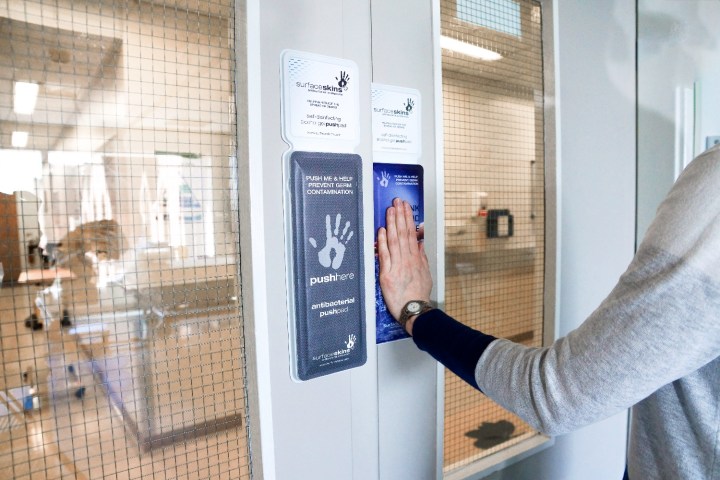
“The problem we’re solving is one that I think everyone can identify with — and that’s not wanting to touch a dirty door or surface,” creator Adam Walker told Digital Trends. “Most people at some point in their lives have probably shoulder-barged or push-kicked open a door to avoid touching it. That’s where the idea originated from. I was in a surgery about seven or eight years ago, and the experience of dealing with this problem made me think that there must be a better way of solving this issue to reduce the spread of germs.”
The idea behind Surfaceskins is relatively simple, although the effect could be profound. Combining three separate nonwoven textiles, the antibacterial door pads dispense a tiny quantity of alcohol gel whenever they are touched. This alcohol gel — the same kind that you find in dispensers in places like hospitals — is forced out of the pad through tiny pores on its surface. This disinfects the pad in just seconds, leaving it clean for the next person who needs to use the door.

The gel-dispensing pads last for 1,000 uses or a maximum of seven days, and can be easily replaced.
“Competitive products on the market — such as copper, nanosilvers, and antimicrobials — are great, but they can take 6-10 hours to work,” Walker continued. “That’s of little use on a frequently touched door. The solution to the problem, therefore, had to be something that would kill bacteria instantly, which moved us toward alcohol gel.” In tests, the pads were shown to reduce bacteria levels by 90 percent. While Walker stresses that these are not a replacement for existing hygiene precautions, they could certainly help in the continuing battle against infection.
Surfaceskins are developed by a spinoff company from the U.K.’s University of Leeds. Walker said that he is already working with distributors and hopes that these smart pads will soon show up everywhere from hospitals and dental chains to cruise ships and restaurants.


